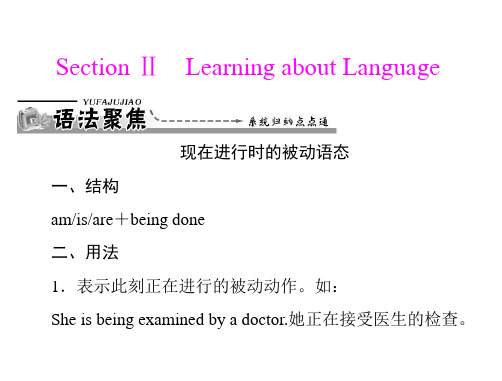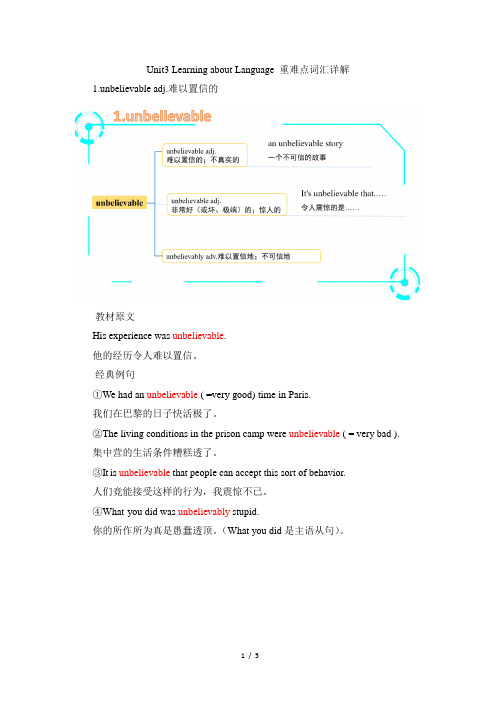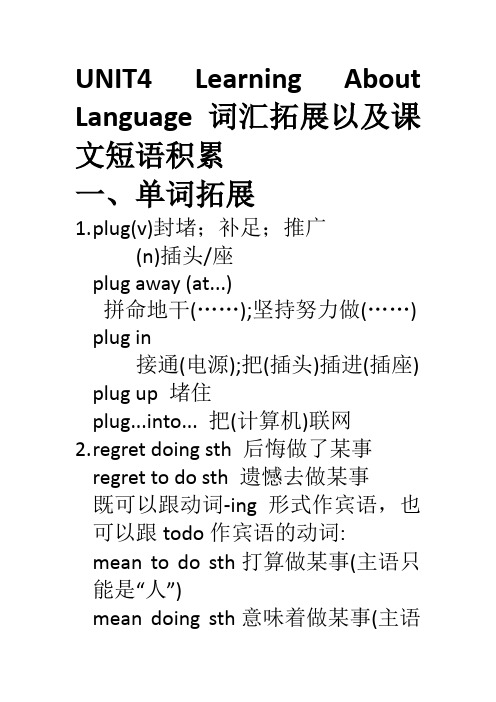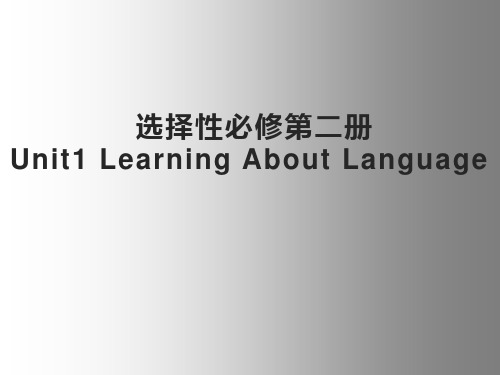learning about language
人教版_高一英语必修二_Unit1_Learning_about_Language_长难句型精析

Unit1 Learning about Language 长难句型精析1. sb. be doing…when…某人正在做……. 就在这时…sb. had just done sth. when…某人刚做完某事,这时突然……sb. was about to do sth. when…某人正要做某事,这时突然……sb. was on the point of doing sth. when…某人正要做某事,这时突然……教材原文One day he was looking in a second-hand furniture shop when he saw an amazing object among the many different vases and jewels. 一天,他正在逛一家二手家具店,就在这时他在众多不同的花瓶和珠宝首饰中看到了一个令人惊奇的东西。
本句是“sb. be doing. when. . …”结构,when在句中为并列连词。
经典例句①He was sleeping when there was a knock at the door.他正在睡觉,这时突然有人敲门。
②I was studying when suddenly my phone rang.我正在学习,这时我的电话突然响了。
③The woman was about to open the door when she heard a strange sound from inside. 这位女士正要开门,这时她听到从里面传来一个奇怪的声音。
④She had just finished the dinner when her father came in.她刚吃完饭,她的父亲就进来了。
2. see+宾语+宾补see是感官动词,其宾语补足语有四种形式,即:see+宾语+教材原文The old man saw some Germans taking apart the Amber Room and removing it. 那位老人看到一些德国人在拆卸并移走琥珀屋。
unit4 section ⅱ learning about language课件 新人教版必修2

这张照片这些天一直在展示。
五、句型变换 现在进行时的被动语态与现在分词的被动式 being done 均 可表示此刻正在进行的被动动作,因此它们之间可以进行句型 转换。如: Please tell me something about the meeting which is being held now.=Please tell me something about the meeting being held
3.“介词 in/onห้องสมุดไป่ตู้under 等+名词”构成的介词短语常含有
被动意义,可代替现在进行时的被动语态,此时名词前一般
不用冠词。如: The bridge is under repair/construction
(=is being repaired/constructed).
大桥正在建设中。 The picture is on display (=is being displayed) these days.
Folk song is being sung next.下面将唱一首民歌。
2.一些表示状态、心理活动、拥有、存在等的动词,一般 不用于现在进行时的被动语态,而用一般现在时的被动语态表
示此时此刻或目前主语正承受谓语动词的动作。如:
Wang Li, come here.You're being wanted on the phone.(×) Wang Li, come here.You're wanted on the phone.(√) 王丽,过来,有你的电话。
(4)having been done 是现在分词完成式的被动,表示完成和
被动,不作定语和补足语; (5)done 是过去分词,表示完成和被动,作定语、状语、补 足语。
高中英语Unit2SectionⅡLearningAboutLanguage新人教版选择性必修第一册

2.补全句子 ①This term will end in July and _I__w__il_l _b_e__g_o_i_n_g__b_a_c_k__h_o_m_e__i_n__t_h_e _co_u_n_t_r_y. 这个学期将于7月结束,我要回到乡下的家里去。 ②I ____sh_a_l_l_b_e_v_i_s_it_in_g__m_y__g_r_an_d_m__o_t_h_er_____at 3 o’clock this afternoon. 今天下午3点我将看望我的祖母。
2 1.单句语法填空 ①Jane can’t attend the meeting at 3 o’clock this afternoon because she __w_i_l_l _b_e_te_a_c_h_i_n_g_____(teach)a class at that time. ②―Could I use your car tomorrow morning? —Sure.I ___w_i_ll_b_e__w_r_it_i_n_g____(write)a report at home. ③At ten o’clock tomorrow, she __w_i_ll_b_e__w_o_r_k_in_g_____(work) in her
3.表示预测可能会发生的事。 When I arrive home, my mother will probably be waiting for me for lunch. 当我到家时,我妈妈可能正在等我吃午饭。 If we keep working hard like this, we will be making a miracle. 如果我们继续这样努力工作的话,我们将会创造奇迹。
LearningaboutLanguage英语课文教案范例

Learning about Language 英语课文教案范例一、教学目标1. 知识目标:(1)学生能够理解并运用本课中的新词汇和短语。
(2)学生能够听懂、说准本课中的对话和课文内容。
(3)学生能够掌握一定的阅读技巧,如预测、推断等。
2. 能力目标:(1)学生能够运用所学知识进行日常交流。
(2)学生能够独立完成阅读任务,提高阅读理解能力。
(3)学生能够通过小组合作,提高团队协作能力。
3. 情感目标:(1)激发学生学习英语的兴趣,增强自信心。
(2)培养学生积极思考、主动探究的学习态度。
(3)培养学生尊重文化差异,拓宽国际视野。
二、教学内容1. 课文主题:介绍不同国家的文化习俗。
2. 课文内容:课文中介绍了英国、美国、中国等国家的饮食、节日、问候语等文化习俗。
3. 词汇短语:食物、节日、问候语等相关词汇和短语。
三、教学重点与难点1. 教学重点:(1)学生能够掌握本课中的新词汇和短语。
(2)学生能够听懂、说准本课中的对话和课文内容。
(3)学生能够运用所学知识进行日常交流。
2. 教学难点:(1)正确运用本课中的词汇和短语。
(2)理解并运用阅读技巧。
四、教学方法1. 情境教学法:通过设置真实的情境,让学生在实践中学习和运用英语。
2. 任务型教学法:通过完成各种任务,提高学生的综合语言运用能力。
3. 交际法:鼓励学生积极参与课堂互动,提高口语表达能力。
五、教学步骤1. 热身活动(5分钟):(1)教师与学生进行简单的英语对话,检查学生的英语水平。
(2)学生进行小组活动,讨论各自的兴趣爱好。
2. 引入新课(10分钟):(1)教师展示课文图片,引导学生预测课文内容。
(2)教师播放课文录音,学生跟读并模仿语音语调。
3. 学习课文(15分钟):(1)教师引导学生逐段阅读课文,理解课文内容。
(2)教师讲解新词汇和短语,学生进行实际运用。
4. 课堂互动(10分钟):(1)教师组织学生进行角色扮演,模拟课文中的场景。
(2)学生进行小组讨论,分享各自的观点和经历。
高一英语必修1课件5-3Learning about Language

Unit5 · 第三课时
成才之路 ·英语 ·人教版 · 必修1
[拓展] lose one's heart to爱上;喜欢上 learn...by heart 记住;背过 put one's heart into sth. 对„„全力以赴;一心一意
Unit5 · 第三课时
成才之路 ·英语 ·人教版 · 必修1
1.when表示时间,在定语从句中作时间状语,其先行 词一般为表示时间的名词。如: October, 1st 1949 was the day when the People's Republic of China was founded. 1949年10月1日是中华人民共和国成立的日子。
Unit5 · 第三课时
Unit5 · 第三课时
成才之路 ·英语 ·人教版 · 必修1
(3)表示所属关系或整体与部分关系时,常用...of which/whom引导定语从句。 ①I have three brothers, two of whom are teachers. 我有三个兄弟,其中两个是教师。 ②She bought five books today, three of which are about English grammar. 她今天买了五本书,其中三本是关于英语语法的。
Unit5 · 第三课时
成才之路 ·英语 ·人教版 · 必修1
4.I have a new friend who/that is named Mary. 5.Have you seen a dictionary whose cover is red? 6.This is the first English book that/不填 I have ever read. 7.I'll never forget the people and things that/不填 I saw in that factory. 8.Things that/which/不填 famous people own are often sold.
英语课标人教实验版高一Module 1 Unit 3 Learning about language

5. --- You’ve left the light on. ---Oh, I have. ___ and turn it off. A. I go B. I’ve gone C. I’ll go D. I’m going 6. --- Is this raincoat yours? ---No, mine____ there behind the door. A. is hanging B. has hung ----Have you moved into the new house? ----Not yet. The rooms___. A. are being painting B. are painting C. are painted D. are being painted
16. ---- do you like the material? ---- Yes, it ____ very soft. A. is feeling B. felt C. feels D. is felt
2. The Browns ________ are going (go) to the
North China by train next week.
They __________ are staying (stay) in Beijing
高中英语人教版(必修第一册) 复习课件:UNIT 5-Learning About Language

[练通]——用care的相关短语填空 ①Wendy cares little __a_b_o_u_t __ her salary, because she cares ____fo_r___
the children and likes to stay with them. ②When traveling, you must _ta_k_e_c_a_re_o_f_ your health. [写美]——微写作_o_w_n_t_o_u_s_a_ll_t_h_at__ light travels in straight lines.
Festival. ③_W__h_e_th_e_r _ he will attend the meeting or not doesn't matter. ④It is obvious to the students ___t_h_at___ they should get well prepared
语法规则 一、主语从句的定义
在主从复合句中充当主语的从句即为主语从句。主语从句的位置可 以在句首, 也可以用it作形式主语, 主语从句放在后面。
❶What please me most is that their artistic talent is extremely shocking. 最让我高兴的是,他们的艺术天赋是非常惊人的。 ❷It worried the mother that her son was always playing computer
2.连接代词(who, whom, whose, what, which, whichever, whoever, whomever, whatever等)
人教_高一英语必修三_Unit3_Learning_about_Language_重难点词汇详解

Unit3 Learning about Language 重难点词汇详解1.unbelievable adj.难以置信的教材原文His experience was unbelievable.他的经历令人难以置信。
经典例句①We had an unbelievable ( =very good) time in Paris.我们在巴黎的日子快活极了。
②The living conditions in the prison camp were unbelievable ( = very bad ). 集中营的生活条件糟糕透了。
③It is unbelievable that people can accept this sort of behavior.人们竟能接受这样的行为,我震惊不已。
④What you did was unbelievably stupid.你的所作所为真是愚蠢透顶。
(What you did是主语从句)。
2.disagree v.不赞成教材原文He was such a stubborn businessman that he didn’t permit anybody to disagree with him.他是一个如此倔强的商人,以至于他不允许任何人与他意见不一致。
经典例句①He disagreed with his parents on most things.他在大多数事情上都与他的父母意见不一致。
②Orange juice seems to disagree with some babies.橙汁似乎不适合一些婴儿(饮用)。
③There is considerable disagreement over the safety of the treatment.关于这种疗法的安全性争论很大。
3.make up组成;化妆;编造;和好教材原文Now make up your own story with new words and phrases from this unit. 现在用本单元的生词和新短语编你自己的故事。
人教课标版高中必修2 Unit3_Learning_about_Language_词汇导图语境速记

Learning about Language
词汇导图语境速记
make use of属于“动词+名词+介词”型短语,一般考查:一方面将短 语中的名词提前作先行词,后接定语从句;另一方面用被动语态。
漫画助记
Make full use of every chance to speak English. 要充分利用一切机会说英语。
漫画助记
The Red Army soldier will give nothing away. 这个红军战士不会泄露任何事情。
He didn't give in to the enemies but his partner chose to give in to the enemies and gave away state secrets to them. 他没有向敌人屈服,但是他的同伴选择向敌人投降,并且把国家 机密泄漏给了他们。
His dream of being a firefighter has been realized but my dream of being a teacher has not come true. 他要当消防员的梦想已经实现了,但是我要当老师的梦想还没有 实现。
漫画助记
He dreamt of becoming an astronaut,and his dream came true. 他梦想当一名宇航员,并且他的梦想成真了。
Unit1Learningaboutlanguage非限制性定语从句课件高中英语人教版选择性

限制性定语从句中,as常用于下列句式
such + 名词 +as +从句
像……一样的;像……之类
the same +名词+ as +从句 和…同样的
e.g.: I have the same book as he has.
We have found such materials as are used in their factory.
In the class, there are 36 students, who are interested in pop
music.这个班有36个学生,他们都喜欢流行音乐。
In the class, there are 36 students, and they are interested in pop music.
3.which指事物,在定语从句中作主语、宾语或 表语,作宾语时可省略。The young man was very happy to get back the gold ring (which) he had lost on the train.那个年轻人领回了在火车上丢失的 金戒指,非常高兴。The little girl is having an apple which is big and red.小女孩正在吃一个又大 又红的苹果
常译成与主句并列的句子
关系词一般不可省略 不能用that, why引导
Translate the following sentences.
In the class, there are 36 students who are interested in pop music.
这个班有36个喜欢流行音乐的学生。
高一英语必修1课件2-3 Learning about Language

Unit2 · 第三课时
成才之路 ·英语 ·人教版 · 必修1
答案:B
祈使句的直接引语变为间接引语时,要在祈
使句的动词原形前加上不定式符号to,同时去掉please,故 选B。
Unit2 · 第三课时
成才之路 ·英语 ·人教版 · 必修1
如果祈使句是否定句,则在不定式前加not,即构成句 型: ask/tell/order sb. not to do sth. “Don't touch anything in the lab”,she said. She told us not to touch anything in the lab.
Unit2 · 第三课时
成才之路 ·英语 ·人教版 · 必修1
(2)vt. 请求,要求。常见用法: request sth. 要求/请求„„ request sb. to do sth. 请求某人做某事 request that sb.shoulddo sth. 要求„„ ①He requested help from his friends. 他请求朋友们帮忙。 ②You are requested not to smoke in the restaurant. 请不要在饭馆里吸烟。
答案:(2)he(should) (3)you to come
Unit2 · 第三课时
成才之路 ·英语 ·人教版 · 必修1
语法精讲精练
Unit2 · 第三课时
成才之路 ·英语 ·人教版 · 必修1
直接引语变间接引语(二) 祈使句的直接引语变间接引语 (1)直接引语如果是祈使句,变为间接引语时,要将祈使 句中动词原形变成不定式,并在不定式的前面加上 ask/tell/order等动词。构成句型:ask/tell/order sb. to do sth.。 “Open the window,”he said. →He told me to open the window.
高中英语选修二(人教版)1-2Learning About Language 教学课件

❶The sweet voice is the characteristic of our English teacher. 甜美的嗓音是我们英语老师的特征。 ❷It is characteristic of people who have only a little knowledge to try to pretend that they have much knowledge.略知皮毛的人的一个特点 是,他们总是努力装出大有学问的样子。 ❸Elizabeth is the most interesting character in the play. 伊丽莎白是该剧中最有趣的人物。
6.a_b_s_o_l_u_te_l_y adv. 绝对地;完全地→_a_b_s_o_lu_t_e_ adj. 完全的,全部的;
绝对的
7._p_e_r_su_a_d_e_ vt. 说服,劝说;使相信→p__er_s_u_a_s_io_nn. 说服,劝说
Ⅲ.重点句型 他正要给他的朋友们端上晚餐,突然意识到忘了打开烤箱,肉还 没烹饪好。 He __w_a_s_r_e_a_d_y_t_o_ serve dinner to his friends ___w__h_en__ he realised that he had forgotten to turn on the oven and the meat was not cooked yet.
was on the wrong road. ②Mrs. Woo said that her husband had just left for work when she
___f_e_lt___ (feel) that her house was shaking. ③Jack was working in the lab __w_h_e_n___ the power cut occurred. ④我正要出门时一个远亲突然来看我了。 I__w_a_s_a_b_o_u_t_to__g_o_o_u_t_w__h_en________ a distant relative came to visit me. 或 I was ready to go out when 或 I was to go out when 或 I was on the point of going out when
Learning+About+Language+单词拓展以及课文短语清单 高中英语人教版(2019)

UNIT4 Learning About Language 词汇拓展以及课文短语积累一、单词拓展1.p lug(v)封堵;补足;推广(n)插头/座plug away (at...)拼命地干(……);坚持努力做(……) plug in接通(电源);把(插头)插进(插座) plug up 堵住plug...into... 把(计算机)联网2.r egret doing sth 后悔做了某事regret to do sth 遗憾去做某事既可以跟动词-ing形式作宾语,也可以跟todo作宾语的动词:mean to do sth打算做某事(主语只能是“人”)mean doing sth意味着做某事(主语不能是“人”)forget to do sth 忘记做某事forget doing sth 忘记曾经做过的事remember to do sth 记住将要做的事remember doing sth 记得曾经做过的事try to do sth 设法做某事;尽力做某事trying doing sth 试着做某事;尝试做某事stop to do sth停下正在做的事去做另一件事stop doing sth停止正在做的事go on to do sth做完某事后接着做另一件事go on doing sth继续(不停地)做正在做的事can't help to do sth不能帮助做某事can't help doing sth 不禁做某事3.d isabled (adj) 有残疾的;丧失能力的搭配:the disabled残疾人(作主语时,谓语动词用复数)【词语积累】(1)disable (vt).使残疾;使不能运转disable sb.使某人残疾disable the alarm 破坏警报器(2)disability (n).残疾,缺陷,障碍a physical/mental disability生理缺陷/心理障碍people with disabilities 残疾人(3)able (adj).能的,有能力的→unable (adj).不能的,无能力的be able/unable to do sth.能够做某事/不能做某事(4)enable (vt).使能够enable sb.to do sth.使某人能够做某事4.r esign(vi.& vt). 辞职;辞去resign from+工作单位(a company, a committee, a factory, etc.)从……辞职resign as +身份名词(manager, chairman,etc.) 辞去……职务resign oneself to (doing) sth顺从;听任;只好接受(to 是介词)resign one's position/post/seat辞去某人的职务resignation (n).辞职;辞里;辞职信;顺从a letter of resignation 辞职信offer/hand on in one's resignation某人呈递/上交辞职信5.d eserve (v) 值得;应得;应收(不用于进行时态)deserve+n./pron. 值得……,应得……deserve doing/to be done值得被……;应该被……(主语是动作do的承受者)deserve to do 应该做……;值得做……(主语发出动作do) deserved (adj) 应得的;该受的归纳拓展:动名词用主动形式表示被动意义的搭配:(1)want/need/require doing(某事)需要被……(=want/need/require to be done)(2)be worth doing(某事)值得被……4. be responsible for..对……负责;是……的原因【词语积累】responsibility (n).责任;负责a sense of responsibility责任感take on/ accept/ shoulder (a/the) responsibility 承担/担起责任搭配take responsibility for... 对……负责have responsibility for... 对……有责任It's one’s responsibility to do sth.某人有责任做某事5.(1)名词doubt 的其他句型:There is some doubt about/of….对……有些疑问。
Unit 1 Learning about language (教学课件)-高中英语

TB P.4 Ex.1 Find the words from the previous pages with the following prefixes or suffixes. Then add two words for each prefix or suffix, and explain their meanings.
Prefix Words Prefix Words Suffix Words Suffix Words
re-
micro-
-ory
-ial
dis-
trans-
-ion
-ology
Prefix redis-
microtrans-
re + unite (v. 联合) reunite (v.) – to unite again 再联合 ;重逢
blocks a key protein in the body cells that is to __b_la_m__e____ for the spread of coldcausing virus. Targeting the host rather than __in_f_e_c_t_io_n__ was a bit non-traditional but
n. 肺
副作用
Topic
British scientists believe they may have found a way to fight the sentence
common cold. It blocks a key protein in the body cells that is to
高中英语人教版(必修第一册) 复习课件:UNIT 2-Learning About Language

❷I'll be reading a book at 10:00 tomorrow. 明天十点我将正在看书。
2.将来进行时通常表示的是对将来事实的简单陈述, 而一般将来 时除表示时间概念外, 还带有感情色彩。
❶Tom will be cutting grass tomorrow. 汤姆明天将正在割草。
balanced diet. 重要的是你应该试着将锻炼和均衡饮食结合起来。
[练通]——单句语法填空 ①[2022·天 津 3 月 卷 ]As working from home becomes increasingly common, people are finding it easier t_o_c_o_m_b_in_e_ (combine) parenthood with
off the TV when we forget. ②(教材P14)In the future, we will be using advanced technology every day for
automatic control of just about everything in our home. ③(教材P14)In addition, your smart home will be monitoring your health for
[佳句] Mum, I'm very busy, so I can't help to clean the room today. 妈 妈, 我很忙, 所以今天我不能帮忙打扫房间了。
[练通]——单句语法填空 ①I wish we could help him _(_to_)_e_a_rn__ (earn) money. ②She can't help __e_a_ti_n_g__(eat) up the whole delicious food on the table. [写美]——微写作 ③当祖国需要我们时, 我们必须尽力。
高中英语选修二(人教版)2-2Learning About Language 教学课件

Ⅲ.重点句型 The biggest reason _w_h_y_h_e__lo_v_e_s_C__h_in_a_, however, is that he
(1)expectations of... 对……的期望 with expectations 怀着希望 live up to/meet (one's) expectations
达到(某人的)期望,如(某人)所愿 (2)contrary to/against/beyond expectation
出乎意料/超出预期 in (the) expectation of... 预计会有……,预料……
consideration. ③Those who continuously acquire new knowledge that they can
apply ___to_____ their work are more likely to succeed.
4.exposure n.[sing.U]接触,体验 [U]暴露;面临,遭受(危 险或不快) [U](在电视、报纸等上的)亮相,被报道;揭露
enjoys being with Chinese people. 然而,他热爱中国的最大原因是他喜欢和中国人在一起。
►第一ed adj. 积极的;主动的 (1)motivate vt. 成为……的动机;激发;激励 motivate sb. to do sth. 激励某人做某事 (2)motivation n.[U] 动力;积极性; [C] 动机 motivation for (doing) sth. (做)某事的动机
2019新人教高中英语选择性必修二Unit1Learning About Language

重点词汇
重点句式
重点语法
随堂练习
2.whether意为“是否”,在句中不作成分。
The question is whether we need more ice cream. 问题是我们是否还需要一些冰激凌。
The key is whether we can solve the problem ourselves. 问题是我们能否自己解决这个问题。 3.what在表语从句中可作主语、宾语和表语。
重点词汇
重点句式
重点语法
随堂练习
重点词汇
重点句式
重点语法
随堂练习
Many scientists subscribe to the view that it is human activity that
has caused global warming. 许多科学家都认为是人类活动导致了全球变暖。 【句式剖析】本句是一个复合句。Many scientists subscribe to...是 主句,that引导的是同位语从句,其中it is human activity that...是强调 句,强调的是从句的主语human activity。 It was Haydn who encouraged Beethoven to move to Vienna. 是海顿鼓励贝多芬移居维也纳的。 It was my brother who bought me the bike as a present. 是我哥哥给我买的这辆自行车做礼物。
disease
5.virus
E.a supporting structure around which something can
be built
答案:1.B 2.E 3.A 4.C 5.D
- 1、下载文档前请自行甄别文档内容的完整性,平台不提供额外的编辑、内容补充、找答案等附加服务。
- 2、"仅部分预览"的文档,不可在线预览部分如存在完整性等问题,可反馈申请退款(可完整预览的文档不适用该条件!)。
- 3、如文档侵犯您的权益,请联系客服反馈,我们会尽快为您处理(人工客服工作时间:9:00-18:30)。
Unit 1 Festivals around the worldl (useful structure)目标:情态动词的语法特征及用法Revision思考并翻译下列句子, 并总结各句中谓语的共同特点1.Most ancient festivals would celebrate the end of cold weather, planting in spring and harvest in autumn2.Sometimes celebrations would be held after hunters had caught animals3.At that time people would starve if food was difficult to find, especially during the cold winter months4.For the Japanese festival Obon, people should go to clean graves and light incense in memory of theirancestors5.Harvest and Thanksgiving festivals can be very happy events6.Some people might win awards for their farm produce, like the biggest watermelon or the most handsomerooster.7.At the Spring Festival in China, people eat dumplings, fish and meat and may give children lucky moneyin red paper1. 情态动词的语法特征1) 情态动词不能单独做, 除外, 后面只能接不带to的不定式2) 情态动词没有的变化, 但有些情态动词, 如也有一般式和过去式的变化。
3) 情态动词的“时态”形式并不是的主要标志, 不少情况下, 情态动词的现在式形式和过去式形式都可用来表示现在时间、过去时间和将来时间。
只作情态动词的;可情态可实义的;可情态可助动词的;相当于情态动词的can 和could1) can的主要用法是:A. 表示体力或脑力的:eg. The girl dance very well.B. 表示说话的推测﹑事物的等: eg. the news be true?C. 在口语中, can可以表示: eg. I sit here?2) could的主要用法是:A. could 是can的过去式, 表示与过去有关的:B. could可以代替can表示请求, 但语气较can :3) can和could ,表示可能已经做某事。
can用在, 表示不相信、怀疑等态度。
may 常用来表示:A. 表示请求、允许; 比can较为正式: e.g. I come in ?B. 表示说话人的“也许” “可能”: 通常只用于中。
在肯定句中,may的可能性比can 高,may表示现实的,can表示的可能性。
在疑问句中,表示可能性用can。
C. 表示祝愿;但: e.g. you succeed!might 的用法有: 多在间接引语中表示过去的。
除了在以外,一般不表示过去的。
如要表示的可能可以用could, 表示过去的许可可以用was (were) allowed to 或者had permission to 。
shall和should 1. shall用于构成将来时是。
shall用于征求对方的意见,表示“决心” 是。
shall可以用于第人称的疑问句,表示;还可用于第二、三人称的陈述句中,表示2. should表示义务、建议、劝告,意为。
表示本应该在过去做但没有做。
must和have to1.must用于一般问句中,肯定回答用否定式用,做“不必”, mustn’t表示2.表示“这个意思时,must 和have to 稍有区别。
must着重说明,have to 强调。
3.must表示对某人某事的, 作, 一般用于。
对过作肯定判断用must have donecan / could, may / might, should和must都可表示。
can / could表示;may表示推测时,其语气;might语气,表示某事;should表示确定或;must表示的语气。
Exercise 1 Finish the sentences1. A: ______ you like to go to a special event with us on Saturday?B: Yes, I _____________________ _________.2. A: ______ Xiao Feng find the origin of Easter from that book? B: No, he _____________.3. A: _____ I go with my friend to the harvest festival? B: Yes, you _________________ ________.4. A: If I want to be a doctor _______ I study science? B: Yes, you __________________.5. A: He is very handsome. ____ he play the role of the prince? B: No, he __________ ______.6. A: The neighbour’ s children are older this year. _______________ they stop playing tricks at Halloween? B: Perhaps, they __________ ___________________.________________________________I. Choose the correct answe r1.—I think I’ll give Bob a ring lat er in the week. —You _____. You haven’t been in touch with him for ages.A. willB. mayC. have toD. should2. John, look at the time. _____ you play the piano at such a late hour?A. MustB. CanC. MayD. Should3. There _____ any difficulty about passing the road test since you have practiced a lot in the driving school.A. mustn’t beB. shan’t haveC. shouldn’t beD. needn’t have4. The World Wide Web is sometimes jokingly called the World Wide Wait because it ______ be very slow.A. ShouldB. mustC. willD. can5. Helen _____ go on the trip with us, but she isn’t quite sure yet.A. shallB. mustC. mayD. can6. Someone is knocking at the door. -- ____ it be Venis? No, it__ be her; she left for New York this morning.A. Can; mustn’tB. Might; can’tC. May; doesn’tD. Can; can’t7. Mike promised his doctor he _____ not drink, and he has never drunk ever since.A. mightB. shouldC. couldD. would8. —Is there a movie on in the cinema tonight? —There _____ be. I will phone the cinema and find it out.A. mightB. shouldC. canD. must9. When I was studying at Beijing University, I _____ take a walk along the lake every evening.A. willB. wouldC. couldD. shall10. Mr Brown, many students want to see you. _____ they wait here or outside?A. ShallB. WillC. CanD. Would(福建2008) It is usually warm in my hometown in March, but it _____ be rather cold sometimes.A. mustB. canC. shouldD. would(浙江2008) You _____ be hungry already — you had lunch only two hours ago!A.wouldn’tB. can’tC. mustn’tD. needn’t。
